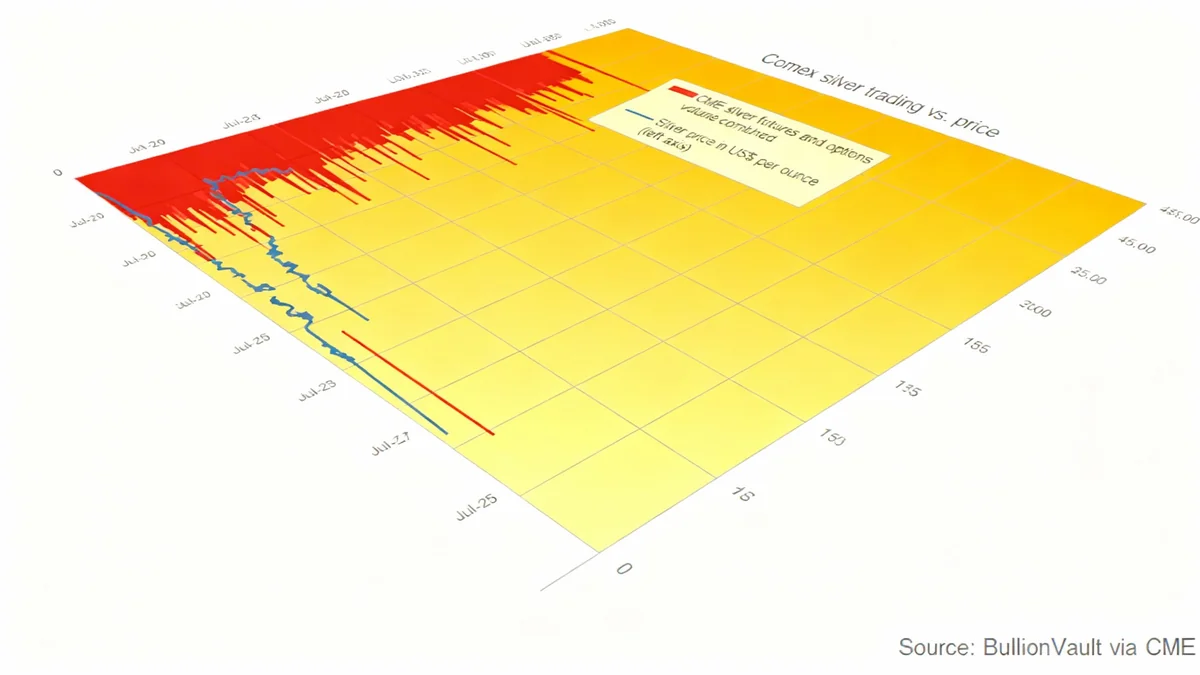US stock indexes closed sharply lower on Tuesday, with the S&P 500 falling to a 1.5-week low. Concerns about high valuations, particularly in the tech sector, coupled with weaker-than-expected vehicle sales and an ongoing government shutdown, fueled a broad market retreat.
Key Takeaways
- S&P 500, Dow, and Nasdaq 100 all posted significant losses.
- Concerns about extreme valuations in tech stocks, like Palantir, drove declines.
- Warnings from major Wall Street banks suggest a potential market pullback of over 10%.
- Weak October vehicle sales and the longest government shutdown in history added to negative sentiment.
- Despite strong Q3 earnings beats, overall profit and sales growth are slowing.
Market Indexes See Significant Declines
On Tuesday, the S&P 500 Index ($SPX) closed down by 1.17%. The Dow Jones Industrials Index ($DOWI) also saw a decline of 0.53%, while the Nasdaq 100 Index ($IUXX) experienced the sharpest drop, falling by 2.07%.
These movements pushed the S&P 500 to its lowest point in 1.5 weeks. Both the Dow Jones Industrials and Nasdaq 100 reached 1-week lows, indicating a widespread negative sentiment among investors.
Market Snapshot: Tuesday's Close
- S&P 500: -1.17%
- Dow Jones Industrials: -0.53%
- Nasdaq 100: -2.07%
Valuation Concerns Impact Tech Sector
The tech sector, particularly AI-infrastructure stocks and the 'Magnificent Seven' megacap technology companies, faced significant pressure. Palantir Technologies, an AI bellwether, saw its shares close down more than 7% despite reporting better-than-expected third-quarter sales.
The stock's price-to-sales ratio climbed to 85, marking it as the highest in the S&P 500. This extreme valuation raised concerns among investors and triggered a wave of selling.
"Equity markets could be due for a pullback of more than 10% in the next 12 to 24 months," warned analysts from Morgan Stanley and Goldman Sachs at the Hong Kong Monetary Authority financial summit on Tuesday.
These warnings echoed investor worries about stock prices, especially after the S&P 500 had surged more than 35% from its April lows to a record high just last week. Lower bond yields, with the 10-year T-note yield falling 2 basis points to 4.09%, provided some underlying support, but it was not enough to offset the broader valuation fears.
Magnificent Seven and Semiconductors Under Pressure
Several key tech giants and semiconductor manufacturers contributed to the market's decline. Tesla (TSLA) closed down over 5%, and Nvidia (NVDA) fell more than 2%. Alphabet (GOOG) dropped over 2%, while Amazon.com (AMZN) and Meta Platforms (META) each lost more than 1%.
Intel (INTC) shares closed down more than 5%, and Micron Technology (MU) fell over 6%. Other semiconductor companies like Advanced Micro Devices (AMD), ARM Holdings Plc (ARM), and Qualcomm (QCOM) also experienced declines of more than 3%.
What are the 'Magnificent Seven'?
The 'Magnificent Seven' refers to a group of large, influential technology stocks that have significantly driven market performance. These typically include Apple, Microsoft, Alphabet, Amazon, Nvidia, Tesla, and Meta Platforms. Their sheer size and market capitalization mean their movements can heavily sway overall market indexes.
Economic Data and Political Headwinds
Beyond market valuations, several economic and political factors weighed on investor sentiment. US October Wards total vehicle sales slowed to 15.32 million, falling short of the expected 15.50 million and marking the fewest sales in 14 months. This indicates a potential slowdown in consumer spending on big-ticket items.
The ongoing US government shutdown, now in its sixth week, is the longest in history. This prolonged shutdown is delaying the release of crucial government reports and is having an adverse effect on the US economy, contributing to market uncertainty.
Supreme Court Arguments and Tariffs
Investors are also looking ahead to oral arguments at the Supreme Court on Wednesday. The court will hear arguments regarding the legality of President Trump's reciprocal tariffs. Lower courts have already ruled these tariffs illegal, citing a specious claim of emergency authority under the 1977 International Emergency Economic Powers Act.
If the Supreme Court upholds these rulings and strikes down the tariffs, the US government might have to refund over $80 billion in collected tariffs. This decision could also limit the President's future power to impose tariffs, restricting it to well-established sections of US trade law like sections 232, 301, and 201.
Q3 Earnings Season Continues Amid Slowing Growth
The third-quarter corporate earnings season is in full swing, with 136 S&P 500 companies scheduled to report this week. So far, 80% of the S&P 500 companies that have reported have beaten forecasts, putting the quarter on track for the best performance since 2021, according to Bloomberg Intelligence.
However, despite these beats, the overall growth picture shows signs of slowing. Q3 profits are projected to have risen by 7.2% year-over-year, which would be the smallest increase in two years. Similarly, Q3 sales growth is expected to slow to 5.9% year-over-year, down from 6.4% in the second quarter.
Q3 Earnings Highlights
- 80% of S&P 500 companies beat forecasts.
- Profit growth expected at +7.2% Y/Y (smallest in two years).
- Sales growth projected at +5.9% Y/Y (down from Q2's 6.4%).
Global Markets and Interest Rate Outlook
Overseas stock markets also settled lower on Tuesday. The Euro Stoxx 50 fell to a 2-week low, closing down 0.34%. China's Shanghai Composite closed down 0.41%, and Japan's Nikkei Stock 225 dropped from a record high, closing down 1.74%.
In the bond market, December 10-year T-notes (ZNZ5) closed higher, with the 10-year T-note yield falling 2.5 basis points to 4.085%. This rise in T-note prices was supported by increased safe-haven demand due to the stock market slump and the ongoing US government shutdown.
Markets are currently discounting a 69% chance of another 25 basis point rate cut at the next FOMC meeting on December 9-10. European government bond yields also moved lower, with the 10-year German bund yield falling 1.3 basis points to 2.654%.
ECB's Stance on Rates
ECB Governing Council member Olli Rehn noted that Eurozone growth remains sluggish but resilient. He highlighted two-sided inflation risks: upward from goods and food prices, and downward from cheaper energy and a stronger euro. Rehn stressed the importance of maintaining full flexibility in decision-making and not committing to any specific interest rate path.
Another ECB Governing Council member, Yannis Stournaras, stated that the Eurozone's growth prospects are subject to multiple downside risks, including trade policy uncertainty, geopolitical tensions, and political uncertainty in France.
Individual Stock Movements
While many stocks fell, some outliers saw significant gains. Expeditors International of Washington (EXPD) surged over 10% after reporting Q3 revenue of $2.89 billion, above consensus estimates. Henry Schein (HSIC) also climbed over 10% following strong Q3 net sales figures.
Yum! Brands (YUM) rose over 7% after reporting better-than-expected Q3 adjusted EPS. Waters Corp (WAT) gained over 6% and raised its full-year adjusted EPS estimate.
Conversely, Sarepta Therapeutics (SRPT) plunged over 33% after a study of its muscular dystrophy treatments missed a primary endpoint. Norwegian Cruise Line Holdings Ltd (NCLH) dropped over 15% after its Q3 revenue missed expectations, pulling down other cruise line stocks like Carnival (CCL) and Royal Caribbean Cruises Ltd (RCL).
Zoetis (ZTS) fell over 13% after cutting its full-year revenue estimate, and CDW Corp (CDW) dropped over 8% on weaker-than-expected Q3 net sales.
Earnings to Watch: November 5, 2025
- McDonald's Corp (MCD)
- Qualcomm Inc (QCOM)
- Humana Inc (HUM)
- Devon Energy Corp (DVN)
- DoorDash Inc (DASH)





